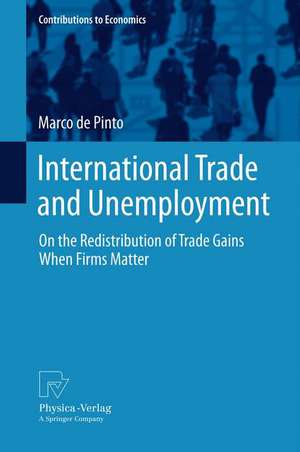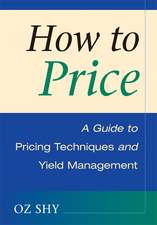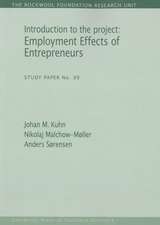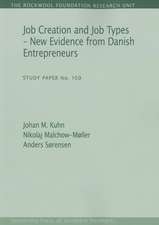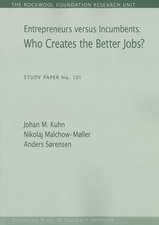International Trade and Unemployment: On the Redistribution of Trade Gains When Firms Matter: Contributions to Economics
Autor Marco de Pintoen Limba Engleză Hardback – 13 dec 2012
| Toate formatele și edițiile | Preț | Express |
|---|---|---|
| Paperback (1) | 632.05 lei 6-8 săpt. | |
| Springer Berlin, Heidelberg – 29 ian 2015 | 632.05 lei 6-8 săpt. | |
| Hardback (1) | 638.11 lei 6-8 săpt. | |
| Springer Berlin, Heidelberg – 13 dec 2012 | 638.11 lei 6-8 săpt. |
Din seria Contributions to Economics
- 18%
 Preț: 1001.81 lei
Preț: 1001.81 lei -
 Preț: 90.83 lei
Preț: 90.83 lei - 15%
 Preț: 649.06 lei
Preț: 649.06 lei - 18%
 Preț: 1109.92 lei
Preț: 1109.92 lei - 24%
 Preț: 657.06 lei
Preț: 657.06 lei - 18%
 Preț: 976.54 lei
Preț: 976.54 lei - 17%
 Preț: 361.01 lei
Preț: 361.01 lei - 18%
 Preț: 1027.83 lei
Preț: 1027.83 lei -
 Preț: 283.93 lei
Preț: 283.93 lei - 15%
 Preț: 644.95 lei
Preț: 644.95 lei - 15%
 Preț: 638.24 lei
Preț: 638.24 lei -
 Preț: 394.29 lei
Preț: 394.29 lei - 15%
 Preț: 636.80 lei
Preț: 636.80 lei - 15%
 Preț: 637.78 lei
Preț: 637.78 lei - 18%
 Preț: 723.69 lei
Preț: 723.69 lei - 15%
 Preț: 635.47 lei
Preț: 635.47 lei - 15%
 Preț: 634.00 lei
Preț: 634.00 lei -
 Preț: 392.75 lei
Preț: 392.75 lei -
 Preț: 383.33 lei
Preț: 383.33 lei - 15%
 Preț: 637.28 lei
Preț: 637.28 lei - 15%
 Preț: 636.80 lei
Preț: 636.80 lei - 18%
 Preț: 950.96 lei
Preț: 950.96 lei - 15%
 Preț: 634.68 lei
Preț: 634.68 lei -
 Preț: 387.38 lei
Preț: 387.38 lei - 15%
 Preț: 647.27 lei
Preț: 647.27 lei - 15%
 Preț: 636.63 lei
Preț: 636.63 lei - 15%
 Preț: 639.73 lei
Preț: 639.73 lei -
 Preț: 385.62 lei
Preț: 385.62 lei - 15%
 Preț: 641.85 lei
Preț: 641.85 lei - 20%
 Preț: 649.60 lei
Preț: 649.60 lei - 15%
 Preț: 641.71 lei
Preț: 641.71 lei -
 Preț: 387.96 lei
Preț: 387.96 lei - 15%
 Preț: 645.47 lei
Preț: 645.47 lei -
 Preț: 385.08 lei
Preț: 385.08 lei - 15%
 Preț: 646.62 lei
Preț: 646.62 lei -
 Preț: 383.33 lei
Preț: 383.33 lei - 15%
 Preț: 638.43 lei
Preț: 638.43 lei -
 Preț: 381.21 lei
Preț: 381.21 lei - 15%
 Preț: 642.51 lei
Preț: 642.51 lei - 15%
 Preț: 637.78 lei
Preț: 637.78 lei - 15%
 Preț: 641.71 lei
Preț: 641.71 lei -
 Preț: 384.70 lei
Preț: 384.70 lei -
 Preț: 379.86 lei
Preț: 379.86 lei -
 Preț: 378.34 lei
Preț: 378.34 lei -
 Preț: 384.70 lei
Preț: 384.70 lei -
 Preț: 388.52 lei
Preț: 388.52 lei - 15%
 Preț: 641.71 lei
Preț: 641.71 lei -
 Preț: 381.00 lei
Preț: 381.00 lei - 15%
 Preț: 644.95 lei
Preț: 644.95 lei -
 Preț: 386.00 lei
Preț: 386.00 lei
Preț: 638.11 lei
Preț vechi: 750.72 lei
-15% Nou
Puncte Express: 957
Preț estimativ în valută:
122.12€ • 126.52$ • 101.92£
122.12€ • 126.52$ • 101.92£
Carte tipărită la comandă
Livrare economică 21 martie-04 aprilie
Preluare comenzi: 021 569.72.76
Specificații
ISBN-13: 9783642332357
ISBN-10: 3642332358
Pagini: 124
Ilustrații: X, 114 p.
Dimensiuni: 155 x 235 x 17 mm
Greutate: 0.35 kg
Ediția:2013
Editura: Springer Berlin, Heidelberg
Colecția Physica
Seria Contributions to Economics
Locul publicării:Berlin, Heidelberg, Germany
ISBN-10: 3642332358
Pagini: 124
Ilustrații: X, 114 p.
Dimensiuni: 155 x 235 x 17 mm
Greutate: 0.35 kg
Ediția:2013
Editura: Springer Berlin, Heidelberg
Colecția Physica
Seria Contributions to Economics
Locul publicării:Berlin, Heidelberg, Germany
Public țintă
ResearchCuprins
Motivation.- International trade and unemployment - the worker-selection effect.- Unemployment benefits as redistribution scheme for trade gains- a positive analysis.- An optimal redistribution scheme for trade gains.
Recenzii
From the book reviews:
“This book is a quality publication, and the author should be congratulated for his useful theoretical research and his talented analysis. … the volume of Dr de Pinto provides a useful reading for theoretical economists interested in trade issues and labor markets.” (Michel Kostecki, World Trade Review, Vol. 13 (3), 2014)
“This book is a quality publication, and the author should be congratulated for his useful theoretical research and his talented analysis. … the volume of Dr de Pinto provides a useful reading for theoretical economists interested in trade issues and labor markets.” (Michel Kostecki, World Trade Review, Vol. 13 (3), 2014)
Textul de pe ultima copertă
Economic theory and empirical research confirm that the rising international integration caused an increase in aggregate income at least for the industrialized countries, although trade liberalization is no Pareto improvement. In the empirical literature, there is a consensus that the international integration implies a destruction of low-skilled job vacancies and an increase in income, while the conclusions are mixed concerning the implication for the overall unemployment rate. This book seeks to find theoretical explanations to these empirical regularities. The book poses three questions: What are the implications of trade liberalization for the labor market in the presence of trade unions if we account for both firm and worker heterogeneity ? What are the implications of a redistribution policy if the government chooses unemployment benefits to partially compensate the losers of trade liberalization ? What is the optimal redistribution scheme for trade gains if the government explicitly takes into account the consequences for the income distribution ? This book presents a rigorous theoretical analysis to answer the questions posed. Beside the well-known firm-selection effect on goods markets caused by trade liberalization, a selection process on the labor market -the worker-selection effect - is presented. The book also argues that if welfare is measured in the traditional manner, i.e. income per capita, compensating the loser of trade liberalization by paying unemployment benefits decreases welfare, but the intensity of the reduction differs with respect to the chosen funding of the unemployment benefits. Another significant contribution of this book is that if the objective function of the government, i.e. the modified welfare function, includes both aggregate income and income inequality, the redistributing of trade gains can lead to an increase in welfare.
Caracteristici
Includes supplementary material: sn.pub/extras
